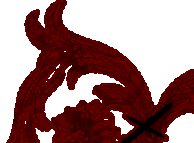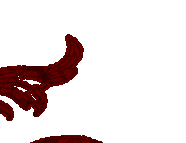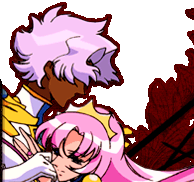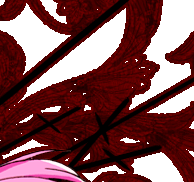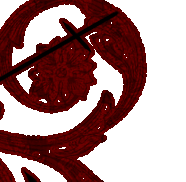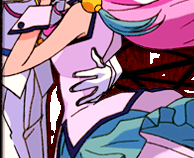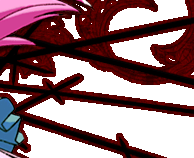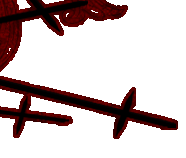
This essay
is posted with the permission of Caleb,
who, I dare say, has done a stunning job of explaining Seazer's seemingly
random lyrics, and has, in the process, given new meaning to the climatic
moments of show. Following
is my interpretation of the final duel chorus. First I'd liked to
thank Verthandi for the translation, though I have altered it in
places. I'd also like to thank Gio, not only for hosting
this essay, but for clearing up a misconception of mine that was
preventing me from understanding Revolutionary Girl Utena and without which writing this
essay would have been impossible.
If at all
possible watch the final duel while or after reading this essay,
for the chorus can't really be separated from the duel. Often times
the lines in the song directly correlate with what's happening on
screen. I was continually amazed as I delved into this chorus at
how subtly it tied in with the duel. Any thoughts or comments are
welcome at caleb_david_!REMOVE!_@angelfire.com.
NOTE ON TRANSLATION:
Translating Japanese is rather subjective. Often times the lyrics
are collections of impressions instead of phrases which are western
ears are more accustomed to. For this interpretation I've often
taken the individual elements and made a phrase. This is based on
the impressions I get, not on my fanboy knowledge of Japanese. Those
familiar with Verthandi's translation will also noted that I've
reorganized the lines in places. Verthandi's translations (I believe)
follow how the lyrics are written in the CD booklets and are also
much better if you want to sing along in English. The purpose of
this translation is to explain the meaning behind the song, thus
my grouping and phrasing are designed to serve this purpose and
will naturally be slightly different than Verthandi's.

'Internal Clock, Municipal Orrery' Explained Orrery
is such an obscure term that I had to dig out the old Oxford dictionary
to find the definition. "Clock of astronomy" sums it up
pretty well. More specifically they're the old models of the solar
system made in the 17th century that automate the orbits of the
planets by means of clockwork gears.
Clocks are
a recurring metaphor for order in this song. Clock = order. A clock
smoothly follows a predestined circular path over and over again
(eternally). The observant will note the parallel to the orbits
of the planets (which are a constant metaphor throughout the show).
The orrery brings both the astrology and clock metaphor together.
They belong together because both have been (and still are by some)
thought to control destiny.
In ancient
times astrology was believed to tell how the clockwork movement
of the heavens controlled human destiny. And until quantum physics
it was accepted that God had made a Universe of perfectly ordered
clockwork which, due to Newtonian physics, had all events preordained
since day one. Both of these models are impersonal and don't allow
for internal determination.
Municipal
means self governing, but in concert with the larger whole. This
quote from Chiho Sato (Animerica Vol. 8 Issue 12) sums up municipality
nicely, "So as a human being, I will do what I need to do to
pursue happiness regardless of others restrictions..." however,
"... I can't act as I want, because I have to communicate with
other people and interact with society." So the title is about
the finding ones internal self governing order. An apt title as
the climax is Utena discovering her own internal self governing
order instead of being governed by Akio's illusions.
An image of Death rocks my mind
Preceding
this line the projector shows us all the outlines from the hundred
duelists. "Images of death." This is to remind us that
the last game ended with duelists dying and foreshadow that Utena
is in danger.
Who is the
"my" in these following lines? I'd attribute the first
part of the song to the "old orrery"; the old order, though
it could also be applied to Anthy. The projector is the symbol for
the old orrery; it's a mechanism that automates the movements of
the heavens, and we get a nice close up of it with this line. It
also controls the movements of the duelists by luring them with
projections of their desires. The old orrery can be thought of as
the desires that keep people from growing up. The externally imposed
myths of manipulative adults (Akio).
Since Revolutionary Girl Utena
is a retelling of the ancient story of the life, passion, death,
and rebirth of the "prince" (a metaphor for God), Utena
is to be ritually sacrificed in this duel (more on this below).
In this line the old orrery affirms that it's time for Utena to
die. This is also Anthy realizing that Utena's not likely to come
out of this alive. However, Utena's not the only one who has death
hovering over her.
The old orrery
itself "dies" in a sense (the projector is "destroyed"
by the swords near the end). When all is said and done Utena and
the other duelists are no longer controlled by the old orrery. Akio
also "dies" in the sense that he ultimately loses this
duel, control over the duelists, and the only person to him that
matters (it's not improbable to think that losing Anthy would make
Akio commit suicide. The movie tends to support this).
I pull the cord, toll the bells
Where there's
death, there are funeral bells. This is also a nod to the bells
that normally toll at the beginning of the duels.
The cock beats its wings when the window opens
But after
death a new day always comes, and the rooster (cock) is the one
who heralds it in. The cock also signals that its time to wake up.
Time for everyone to wake up from their dreams and face reality,
which is what Revolutionary Girl Utena is all about.
Of course,
the cock is a bird (the chick), one of those symbols that constantly
is showing up throughout the show. This line evokes the chick flying
free as the egg (castle/window) cracks (crumbles/opens).
At first
glance Seazer's songs seem quite random and insane, but there's
an order to the madness. We had the progression from death, to a
funeral, to the new day, and this line also provides the transition
to line about the twelve disciples as it's a reference to the cock
in the scriptures which Christ predicted would crow after Peter
had denied him three times.
Utena is
devoted to Dios, (God) her prince, and tries to resists falling
in love because she sees is as betraying her love for her prince.
Thus the three big progressions in her relationship with Akio can
be seen as three denials of Dios. #1 when she accepts Akio's kiss
(Ep 30) #2 When she half-heartedly lets him fuck her in the hotel
room (Ep 33) #3 When she full-heartedly has sex with him in the
woods (Ep 36).
In this episode
Utena discovers that Akio is her prince, and yet she refuses him
three times. #1 When he offers to live happily ever after with her
for eternity in the castle she refuses by taking back her sword.
#2 Akio asks for the sword again in the elevator, but she doesn't
hand it over. #3 At the beginning of the duel Akio warns her that
this isn't a play duel and gives her one more chance to "put
up her sword", but she continues to fight.
Most people
would be quite proud at managing to slip so many layers of meaning
into such a subtle transition line, but Seazer's not done yet. This
line makes me think of the start of a cock fight, with cage doors
being opened and the cocks showing off with wing beating before
they charge into the ring. This metaphor goes even deeper as a cock
fight works on another level as a very apt name to call the duels
by. I mean, what would you call a fight that takes place in the
head of a giant penis as beautiful bisexual combatants surrounded
by erections attempt to deflower each other?
The twelve disciples are mere dolls;
Unblinking, a grand parade;
The old orrery (clock of astronomy): an automatic mechanism
Twelve
disciples is of course the disciples of Christ. Twelve is also a
recurring number in this song, which just happens to coincide with
the number of major players:
#1 Akio
#2 Anthy
#3 Utena
#4 Mikage
#5 Kozue
#6 Miki
#7 Shiori
#8 Ruka
#9 Juri
#10 Nanami
#11 Touga
#12 Saionji
Twelve also
just happens the be the number of bodies in an "old orrery":
#1 Earth
#2 Moon
#3 Sun
#4 Mercury
#5 Venus
#6 Mars
#7 Asteroid belt
#8 Jupiter
#9 Saturn
#10 Neptune
#11 Uranus
#12 Pluto
"Unblinking,
a grand parade" links the preceding and following line, as
it applies to both. The disciple line is about the duelist who are
dolls unblinking following the grand master plan, unblinkingly marching
around and around the automated orbits that have been prepared for
them.
But is it
right to lump Akio and Anthy in with the other duelists as "mere
dolls?" Very much so. More than any of the other duelists,
Akio is a slave to his desire. His desire for the power of God is
at the heart of all his actions and thus controls him. And Anthy's
memory of her love for God controls her and binds her to Akio. She
even tells Utena that she's a "doll without a heart".
Besides helping
paint Utena as the sacrificial savior figure and fitting into the
other Christian imagery in the song, the twelve disciples are a
very apt metaphor as the characters are controlled by things like
their admiration for God (Dios), desire for the power of God, wishing
for miracles, or longing for eternity.
Orrery is
such an obscure term that they threw in the definition.
The twelve constellations of the ecliptic me:
The zodiac, I, the zodiac
Once again
the number twelve. As everyone knows there are twelve constellations
that make up the zodiac of astrology, and the signs of the zodiac
are said to control human fate. This line applies to Anthy as well
as the old orrery/projector, and helps transition to the next stanza
which will be from Anthy's viewpoint.
Just as the
zodiac controls the movement of the twelve constellations and the
fates of those born under them so the projector controls the movements
of the twelve characters with its projections of their desires.
Anthy also embodies these desires, so she controls the cast in a
similar manner. Thus they can both claim to be the zodiac that controls
people.
Note that
the camera gives us a shot of Anthy as this line starts, and goes
in for a close up when we reach "Ecliptic me", which is
definitely about Anthy. The moon has long been associated with the
goddess (Anthy), and is what causes eclipses by blocking the light.
Just as Anthy is said to have sealed away the light of Dios. She's
also going to attempt to snuff out Utena's light, just as she's
helped bring down many other victors through out the ages. The old
orrery also keeps people from growing up, blocking their light by
keeping them trapped within their desire.
From within my body from olden times
A twelve tiered pagoda rises above
A visceral landscape; Utopia
As mentioned
above, these lines are from Anthy's perspective (they work for Utena
also), and so the camera starts giving us lots of Anthy shots. This
line is about how the duelists build there hopes for their ideal
(utopian) future upon Anthy. The Sword of God which has the power
to revolutionize the world and create Utopia literally rise from
within Anthy's body.
Once
again the number twelve. Only one pagoda in Japan has twelve tiers,
and that's the Emperor's pagoda.
Utopia
coming from within a body also brings to mind human sacrifice that
was practiced in olden times ("from olden times" also
means Anthy has been doing this for a long time). Humans were often
sacrificed to the old gods because it was thought that the blood
from within their body would bless the nation and bring about prosperity.
So from Anthy's sacrifice to the Swords of Hate, Akio (the emperor
of the pagoda) aims to achieve Utopia (recover the power of God).
What's
interesting is that when we look at the line from the perspective
of human sacrifice these lines also apply to Utena (except for the
olden time line, unless we look at Utena as symbolizing the archetype
of the sacrificial "prince"). Utena's soul sword which
can revolutionize the world and create Utopia rises from within
her body too. The camera goes along with this, giving us a close
up shot of Utena after the close ups of Anthy,
In a cemetery, a church, a cloister
Now we
come from the "olden times" to the beginning of this current
game, the scene where Utena caught a glimpse of her Utopia. This
line also brings the focus on Utena and the camera goes along, helping
provide a transition into the next verse which is about Utena. This
is also where Akio caught a glimpse of a specimen with noble enough
motives that could produce a soul sword from within her body strong
enough to bring about his Utopia.
Eye of Earth; motive specimen
Akio asks
Utena if she knows what she's doing to which she responds "Sure
I do!" and then strikes her dramatic pose, making all eyes
focus on her to see what her next critical move is, thus the "Eye
of earth" line in the dramatic pause. "Motive specimen"
line coincides with Utena's declaration that'll she become a prince.
Utena herself is the "motive specimen," Akio's chosen
specimen who's he's nurtured to have a noble enough motives to revolutionize
the world.
Intellectual organ of stone; the sign of Motive Power
Intellectual
organ is the mind. Stone means the mind is set in stone, frozen
in one thought; Be a Prince and save Himemiyia. A single unshakable
thought that's set in stone is actually a very powerful thing, many
people have overcome enormous odds by keeping one inspiring thought
in their heads throughout an ordeal. Utena has resolved her conflicting
desire of becoming a prince and reuniting with her prince, thus
unleashing the "Motive Power" of a set in stone conviction.
Because Utena's found her Motive Power all hell starts breaking
loose; the stone statue of Dios explodes here because Akio no longer
controls Utena through her memory of the Prince. The Akio cars that
mark his territory also disappear as he's no longer in control.
Unfinished embryo The secret of death
This line
relates to the preceding in that it shows another reason why Akio's
hold on Utena has broken and he's going to lose. Utena is an unfinished
embryo in that she's not grown up yet, she's still a girl. The goal
in Revolutionary Girl Utena is to grow up. And how does one do that? Through "death",
or letting go of your imaginary world. Utena has let go of the false
Prince of her memory and can now beat him.
"Secret
of death" has a long religious history. All the way back to
primitive people we find the myth of the god who through dying is
reborn. In Greece this took the form of the Elysian Mysteries where
the initiate took place in a symbolic ritual death which was said
to grant eternal life. We're most familiar with the Christian version
where Christ states that those who would live must die. This is
often taken as our death of our self or ego, our worldly nature.
Another common motif of this is the Phoenix that is reborn from
the ashes of its death (its not a coincidence that the Ohtori Academy
is the Phoenix Academy). The secret of death is that through letting
go of our selves we can find new life. All of the duelists experience
this renewed life through the letting go of their personal worlds.
From the theatre, to the hospital, to the historical museum
Utena is
on Akio's stage right now. After word she's going to need to be
hospitalized considering what Anthy is about to do. Then Utena will
be regulated to history, becoming a legend. This is the process
with all important things. Consider the city of Rome. It was once
the main player on the international stage, but then it declined
and was severely injured (in need of hospitalization). Now its little
more than a big historical museum and a piece of ancient history
to most of us.
Artificial flesh; grotto, labyrinth
Illusionary construction; marble
Artificial clock; weight, spring
Spinning and turning, individual time
All three
things here are basically the same things, symbols for the artificial
illusions which trap people in a labyrinth that keeps them from
growing up. As Verthandi points out the grotto is probably a reference
to the cave where Christ was entombed, thus adding to the Christian
imagery. So the artificial flesh is made up of an entombing labyrinth.
The illusionary construction (the castle) is made up of marble.
And the artificial clock operates by the impersonal mechanical functions
of weight and spring.
The artificial
clock also is a symbol for the artificial externally imposed order,
the old orrery. The external artificial order changes from time
to time, morals and cultural beliefs are always "spinning and
turning." But then we come to individual time. One's own order.
Utena is no longer controlled by Akio's external order, but has
found her own individual order. Note that at "spinning and
turning" we have an intact shot of the castle, but when "individual
time" comes up the castle starts to fall apart. That's because
when someone finds there individual order they are no longer controlled
by others myths. Individual time also brings us squarely back to
Utena, which is good since the next lines are hers.
From the ancient city to me
It ends with that day; quotidian clock, the sun in daytime
The me
is Utena. Akio's games been played since the time of the ancient
cities, but it's now going to end with Utena. The quotidian (everyday)
clock is the old orrery, and we're treating to a prominent shot
of the projector along with those words. And when they sing "the
sun in daytime," the camera gives us a close up of Akio. Akio
is the ascendant sun right now. But its going to end for the old
orrery and him soon.
The moon at night; The natural clock of a day
The coming
of night signals the fall of the sun. Note at this line we get a
picture of the Utena lunge. Just as the moon heralds the coming
of night, Utena heralds the coming of Akio's fall, the setting of
his sun. The natural clock is the one that dictates the inevitable
rises and falls. Right at the end of "The moon at night"
line we switch to a picture of Anthy. We have the moon/goddess connection
as mentioned above, but this also indicates how Anthy will be bringing
down Utena. Also, in the end Anthy also brings down her brother
and the old orrery by choosing to leave. The natural clock line
also provides for the transition to clock sounds.
Bong, bong, ding dong ding
Here's
the natural clock signaling that time is running out. For a lot
of people actually; Utena, Akio, and the old orrery. You can see
as Utena fights Akio that she's pushing him back from the light
into the darkness.
The corporeal city and the mystery of the clock
Geometric law, puritanical construction
Corporeal
city is a metaphor for form, the clock a metaphor for order. Form
is bounded by geometric law and order in cities, states, and civilization
always starts bound by puritan morals. Utena herself is a pure and
noble construct.
Monotonous is eternity;
The present; perpetuity
These lines
are Anthy's and Akio's POV I believe. I imagine these fairly cynical
lines are going through Anthy's mind to prepare her for and justify
her betrayal of Utena. The same monotonous patterns play themselves
out again and again before these eternal gods. The present is just
the same patterns perpetuating themselves.
The reality of all Creation is infinitely changing monotony
Though
creation and reality keep changing, the basic monotonous pattern
of rise and fall keeps repeating. These set of lines probably are
a reflection of the pessimistic and weary view of the world held
by Anthy (and Akio).
I will take the form of a corporeal city
I shall take the form of a suspended clock
This is
Utena saying I will take my own form created by my own order as
she defiantly stares Akio down.
Municipal clock, a discovery
Municipal clock, an understanding
Municipal clock... annihilation!
Utena has
discovered and understands her own self governing order which allows
her to stand on her own. And then Anthy has to come along and mortally
wound her, betraying her with a kiss just as Judas did to Christ.
Of course, the prince has to get betrayed and "annihilated"
towards the end.
 |

